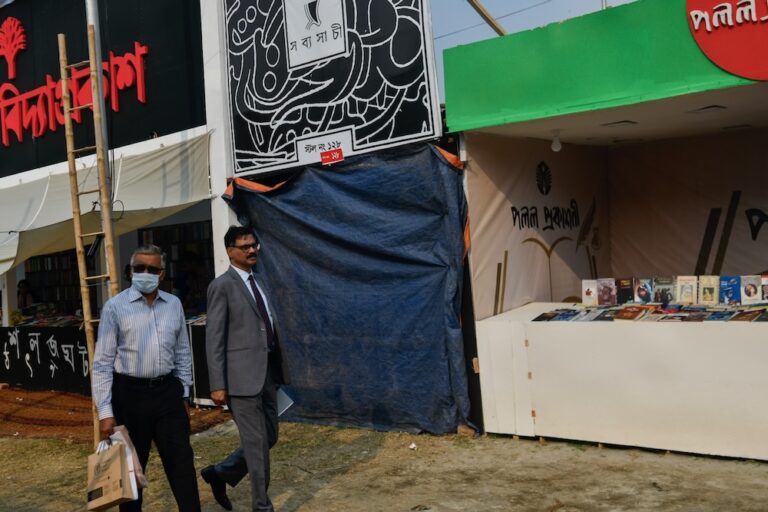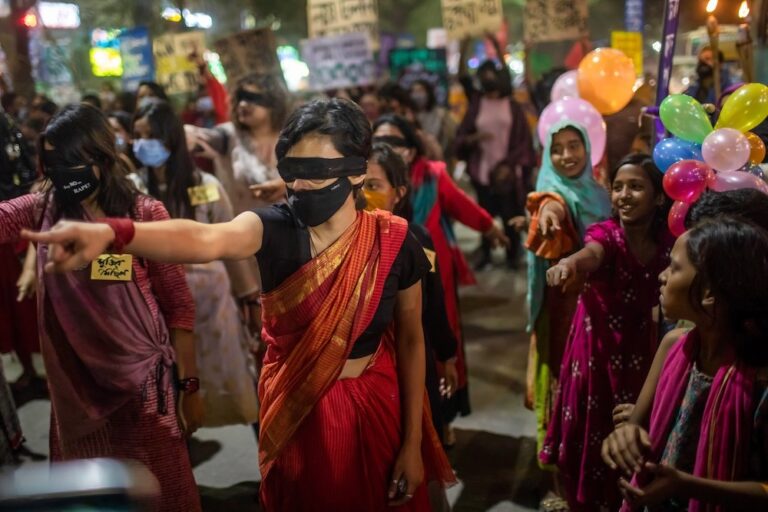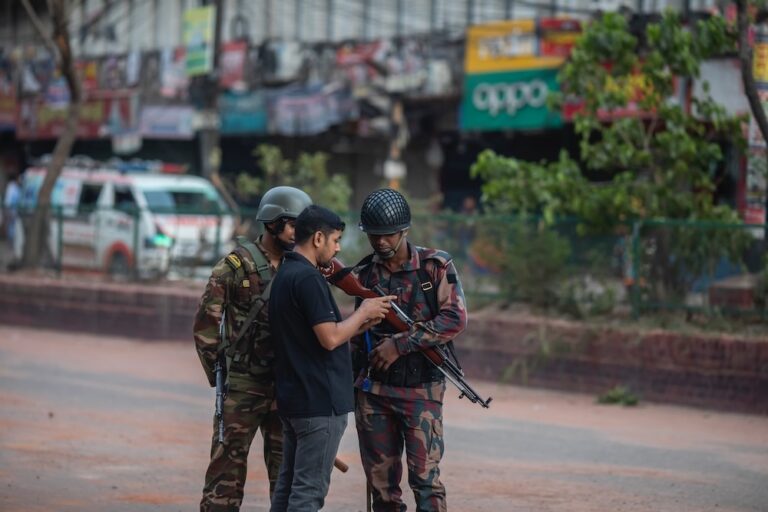(RSF/IFEX) – The following is an RSF press release: At least eighteen journalists attacked by BNP and Jamat-e Islami activists The BCDJC and RSF ask the Bangladeshi prime minister to fight impunity Since the large electoral victory of the alliance, which was built around the Bangladesh Nationalist Party (BNP), opposition journalists have been victims of […]
(RSF/IFEX) – The following is an RSF press release:
At least eighteen journalists attacked by BNP and Jamat-e Islami activists
The BCDJC and RSF ask the Bangladeshi prime minister to fight impunity
Since the large electoral victory of the alliance, which was built around the Bangladesh Nationalist Party (BNP), opposition journalists have been victims of BNP and Jamat-e Islami (Islamist party, member of the new majority) supporters’ violence. Moreover, people from the BNP and the new majority have uttered threats against some private media outlets.
In this context, the Bangladesh Centre for Development, Journalism and Communication (BCDJC) and Reporters Without Borders (RSF) ask the prime minister to take vigorous measures in order to stop this violence. Both organisations, which work to defend press freedom, solemnly call on Begum Khaleda Zia to commit herself to a resolute fight against the impunity of journalists’ murderers and attackers. “Whatever their political allegiance or whoever their protectors are, people responsible for serious breaches of free expression have to be identified, tried and punished,” BCDJC and RSF directors declared.
“The recent violence does not bode well for your government’s policies towards the opposition press,” added the two organisations, which recently decided to work together against impunity and defend press freedom in Bangladesh. Finally, RSF and BCDJC ask the prime minister to call to order the leaders of the alliance parties that threatened opposition media. “Every excessive word and hate speech must be punished.”
According to the information gathered by RSF and the BCDJC, at least eighteen journalists were attacked or threatened since the electoral victory on 1 October 2001.
On 3 October, a group of miscreants attacked the houses of three journalists working in Bhola (south of the country). They first went to Jugantor correspondent Amitabah Apu’s house. They looted, fired shots and threw a hand made bomb. The journalist was not at home. They also went to Prothom Alo correspondent Farid Hossain Babul’s house, where they also looted and fired shots. Finally, they attacked the house of Hahibur Rahman, editor of the local newspaper Banglar Kantha, and disconnected the phone lines.
At the same moment, in Jamalpur district (north of the country), a terrorist group claiming to be BNP members ordered Lutfur Rahman, a correspondent from Muktakantha newspaper, and Shafiqul Islam, a journalist from Dainik Manavzamin, to leave the area if they did not want to suffer serious reprisals. The two reporters published articles about violence during the campaign.
On 6 October 2001, Chakor Malitha, a correspondent from Prothom Alo, an independent daily, was attacked by activists of the student branch of the BNP, Jatiyatabadi Chattra Dal (JCD), at Jahangirnagar University (near Dhaka). A group of students chased the journalist at the university. While he was trying to take a bus to escape to the centre of Dhaka, Chakor Malitha was beaten with metal bars and sticks. Seriously injured, he was taken to a hospital, where doctors had to give him twenty-five stitches. According to some of the journalistâs colleagues, activists thought he had to “pay” for Prothom Alo’s coverage of Jatiyatabadi Chattra Dal’s activities. Jahidul Islam, a correspondent from the daily Jugantor, also received death threats from BNP supporters at the university.
The same week, militants from the student branch of the Jamat-e Islami threatened to kill Abul Kashem Khan, president of the Mirzapur press club (north of Dhaka). On 6 October, the journalist lodged a complaint and asked the police to ensure his protection. According to the reporter, fundamentalists reproached him for his critical articles.
On 6 October, JCD activists occupied the office of the Khaliakor press club. They hung a sign board with the words, “City branch of the JCD”. The press club president lodged a complaint. The journalists protested to the local BNP leader, especially since the chief of the activists’ group is the son of the BNP vice-president. No action was taken by the BNP or the authorities. Later however, the activists threatened to kill the three journalists who lead the press club.
Between 5 and 7 October, three journalists were violently attacked in Satkhira (south-west of the country). On 5 October, Abdul Wahab, a correspondent from the daily Samachar, was taken to a hospital after being assaulted by unidentified people in the street. The next day, Moslem Ahmed, a correspondent for the now-defunct government newspaper Banglar Bani, was beaten near the bazar in Kolarua, Satkhira. According to the press freedom watchdog Media Watch, the police arrested him after the attack, for unknown reasons. On 7 October, Abu Ahmed, a correspondent from the Daily Star and local leader of a trade union linked with the Awami League, was attacked by four persons with unknown motives.
BNP student branch activists attacked Swapan Basu, a reporter from the government news agency Bangladesh Sangbad Sangstha, at Dhaka University, on 8 October 2001. Beaten by a group of about fifteen militants, the young correspondent, also an Awami League student branch supporter, was later taken to hospital. He lost two teeth. Two press photographers, Zia Islam (Prothom Alo) and S.M. Gorky (Jugantor), were also attacked while they took pictures of the assault on Basu.
On 10 October, the Jamat-e Islami student branch issued a threat during a meeting of press correspondents at Rajshahi University. “Be prepared, your time is over. Now our time has come. You have written a lot against us. Now drop your pen or otherwise you will suffer for your deeds,” said Shafiqul Islam, leader of this group. He threatened the reporters with reprisals.
At the same time, Maulana Delwar Hossain Sayeedi, a Jamat-e Islami member of parliament, threatened Shafiul Haque Mithu, a correspondent from Dainik Janakantha, and asked him to leave Pirojpur (south of the country). The journalists wrote articles about the participation of the fundamentalist leader in massacres during the 1971 independence war.
On 10 October, henchmen of Bacchu Mollah, son of Ahsanul Haque Mollah, the new minister of posts and telecommunications, ransacked the home of Jahurul Islam, a correspondent from Dainik Jugantor in Daulatpur (district of Kushtia, west of the country). The journalist was not home, but his elder brother was beaten and taken to the residence of the BNP leader’s son by his assailants. They forced him to sign a letter in which he agreed to provide them with information that would help them capture his brother. Four days later, the minister’s son threatened journalists during a press conference, telling them not to blame him for the attack. On 15 October, the home minister ordered police to raid Bacchu Mollah’s residence, but they failed to arrest him. The same day, the minister of posts and telecommunications complained to the prime minister about the raid, just as she came back from the holy city of Mecca. Khaleda Zia allegedly answered that he will be dismissed if he does not control his son’s behaviour.
On 14 October, unknown persons attacked the Gazipur press club (north of Dhaka). They stole a television and damaged furniture and the portrait of Shiekh Mujibur Rahman, Bangladesh’s first president. The leaders of the press club filed a complaint and accused BNP supporters of being behind the attack. The local authorities expressed their concern but did nothing more.
On 15 October, supporters of Salauddin Quader Chowdhury, adviser of the prime minister and BNP member of parliament for Chittagong (south east of the country), went to Prothom Alo’s office in the town and issued death threats to journalists. The previous day, the newspaper published an article about the activities of the MP’s henchmen. “Who wrote this article?” asked the activists.
Since their large electoral victory on 1 October 2001, activists of the BNP and Jamaat-e Islami (a fundamentalist party allied with the BNP) have killed thirty people and wounded at least 1,000 others. Most of the victims are members of the former ruling party, the Awami League, and religious and ethnic minorities. According to the independent Daily Star, “Khaleda Zia’s repeated appeals to her supporters to exercise restraint and not victimise their opponents appears to have fallen on deaf ears.”
RSF and BCDJC also wish to continue their efforts to obtain the arrest and punishment of former Awami League MP Joynal Hazari, culprit of several press freedom violations. The defeated Awami League candidate for the Feni constituency was included on the list of thirty-seven international press freedom predators. He joins Mullah Omar, Jiang Zemin and Burmese dictator Than Shwe.
RSF and BCDJC have evidence of the direct implication of Joynal Hazari in the attack against Tipu Sultan, correspondent from the news agency UNB in Feni. According to some testimonies, Hazari supporters broke Tipu’s hands and legs on the orders of the MP. The two organisations are ready to prove Hazari’s guilt during a trial.
RSF and BCDJC are also very happy to announce that Tipu Sultan, whose family still receives threats from Hazari supporters, was nominated for the 2001 Reporters Sans Frontières  Fondation de France Award. The extreme brutality of the aggression he suffered and his constant fight against impunity is an example for our common fight for press freedom. Six others journalists were nominated for this international award: Sihem Bensedrine (Tunisia), Michèle Montas (Haiti), Qi Yanchen (China), Reza Alijani (Iran), Geoffrey Nyarota (Zimbabwe) and Gregory Pasko (Russia). The final decision will be known on 28 November 2001.


